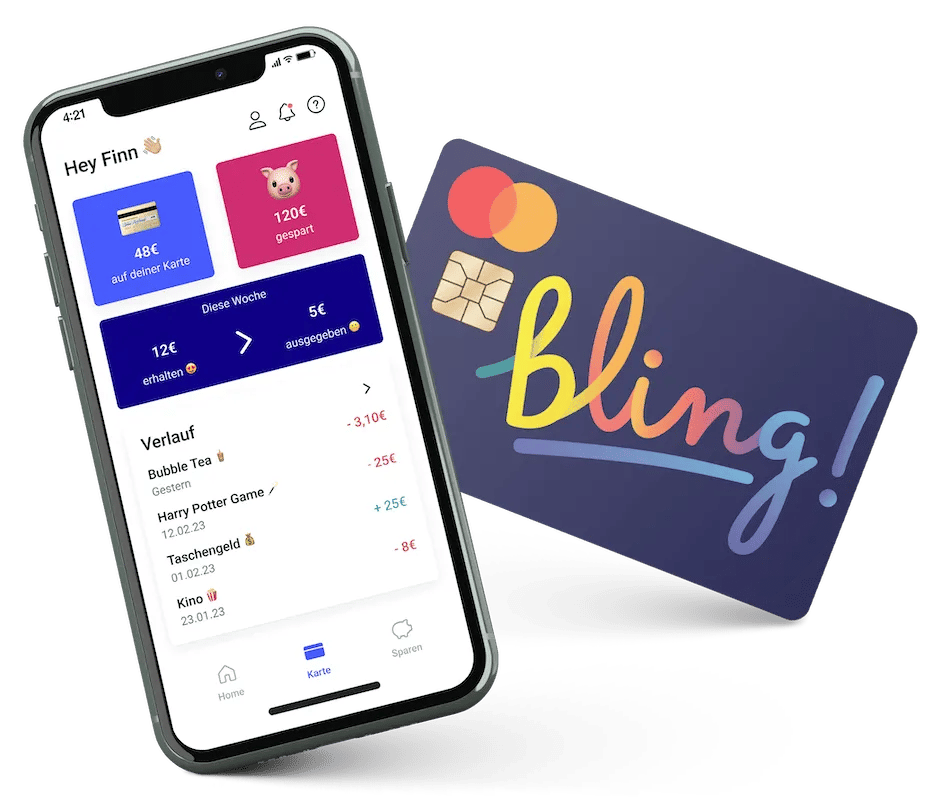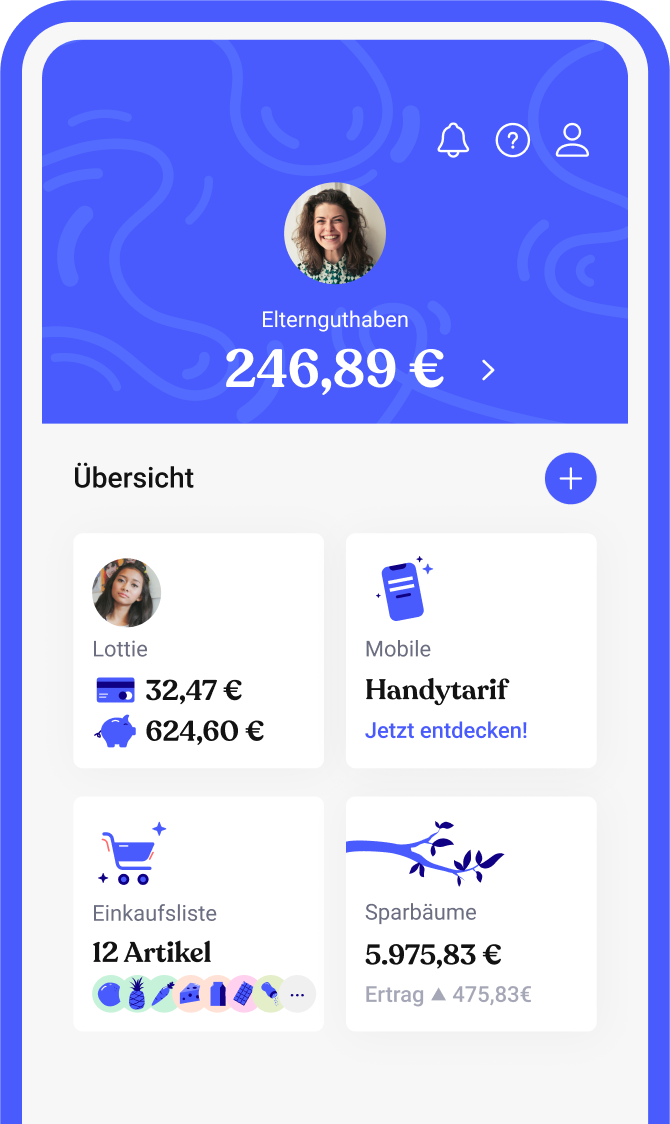What is the pocket money paragraph?
In this article, you will find out whether it is mandatory by law to pay out pocket money, what the pocket money paragraph is all about and also whether your child is entitled to child benefit. Children's rights are enshrined worldwide by the UN Convention on the Rights of the Child and enshrined in the German constitution. These include, for example, the right to life, survival and development. There are also many more. In total, the Convention contains 54 articles of children's rights. They all have one goal: to protect and promote the well-being of our children.
However, this does not include the right to pocket money. The payment of pocket money is not required by law in Germany — There is no entitlement to pocket money for children. Nevertheless, we pay it to our children after a certain age. And that's a good thing: from a pedagogical perspective, it is undisputed that children can learn how to handle money on their own at an early age — a fact that benefits them later in life. The Child Protection Association therefore says that every child, although they have no legal claim to pocket money, has a moral right to pocket money.
Now, when looking at the Civil Code (BGB), we have nevertheless found the so-called pocket money paragraph § 110. It is written in this: “A contract concluded by the minor without the consent of the legal representative is considered effective from the outset if the minor performs the contractual performance using means provided to him for this purpose or at his own free disposal by the representative or with his consent by a third party.”
If you want
At the age of seven, children can pay in cash
This means that children can also go shopping without the consent of a legal guardian, for example in the supermarket or in the ice cream parlour. The purchase is legally valid as long as your child can pay the price with the pocket money that you make available to him. The paragraph applies to children over the age of seven years. If the child is younger, sellers must reject the purchase or cancel it retroactively. Further detailed information on the pocket money paragraph can be found in the articles”The pocket money paragraph — simply explained” and”The pocket money paragraph: From this age, children are allowed to shop.”
If you want
First allowance between four years and the start of school
We state: Legally, your child can pay with cash from the age of seven. Of course, you can also give him pocket money earlier. Your child is then not yet legally competent, but can already start saving or go shopping with you. It is recommended to base the date of your first allowance on the individual development level of your child. You can also check out our Pocket money recommendations take help.
Because then your child will have learned to manage their own money for the first time and will be able to manage their budget better over a longer period of time. You can adjust the amount at various levels depending on your age. Find out in our Pocket money tablewhich amounts are appropriate.
If you want
No legal right to pocket money — child support does not have to be paid out as pocket money
Parents in Germany are now entitled to so-called child benefit. It is used to ensure basic care for children. You will receive a monthly amount for each of your kids. If your child completes education or studies, payment is even possible up to the age of 25.
What about child support? Are children legally allowed to claim it from their parents? Here too, the answer is no. Child benefit is financial support for parents, which is intended to be used, for example, to buy food, clothing or school supplies. Parents are generally not obliged to make a direct payment to the child.
If you want
Use child support for existential everyday things
But: exceptions confirm the rule. If parents are unable to guarantee regular maintenance, children have the option to apply for payment of child benefit. The family fund can then pay out the amount directly to the child. However, this only happens very rarely in particularly difficult conditions.
Of course, you can use the child benefit or part of the amount to pass it on as pocket money. In principle, however, child benefit should be used to provide one's own children with food and other things that are essential for daily life. The pocket money also serves as an additional budget with which adolescents can buy themselves something that goes beyond the necessary purchases in the supermarket.
If, on the other hand, your offspring is a bit older and, for example, buys their clothes without your presence, it makes more sense to pay part of the child benefit as a kind of pocket money. Because in this case, your child will take over their clothes themselves and can therefore also use the money that should be used for this purpose, among other things: child benefit.
It is also clear that whether you use part of the child benefit for pocket money or not always depends on your income. Because parents also have to be able to afford pocket money, especially when your child gets older and demands increase.
If you want
No right to pocket money — why it still makes sense
As already mentioned, although children have no legal right to pocket money, it can help them learn how to handle money properly at an early stage. What does that mean for your child? It means that your offspring is learning
- to save and be yourself Allocate money,
- self-employed Decisions to make and responsibility to take over
- more independent To be from his parents
- and in adulthood Be good with money and can therefore possibly avoid money problems.
Pocket money also gives your child the opportunity to make mistakes and learn from them. Maybe they already spend their money at the beginning of the month and then realize that it wasn't such a good idea. The advantage: The mistakes happen in a situation in which they have no serious consequences. Nothing will happen to your child due to these mistakes with small sums of money, but the learning effect is still there.
If you want
Other benefits of pocket money
Although children are not entitled to pocket money, it makes sense to pay out a certain weekly or monthly sum. On the one hand, because it teaches your child how to handle money and, on the other hand, because it also has advantages for you as a parent:
- Fewer discussions about money: There are probably disputes about money in every household — especially when children are also involved. A major advantage of pocket money is that discussions and disputes can be reduced. Just determine from the start how much money your child receives per week or month and then there is nothing to shake about. Important things such as groceries, clothing and school supplies are usually paid for by the parents anyway, so it is not bad if the child is out of money for a few days because they have already spent everything.
- Less begging: You walk through the shopping center with your child and suddenly something catches his eye that he really wants — and then the begging starts. — Who doesn't know that? In such moments, it is often difficult as a parent to stay strong because you are reluctant to refuse your child a wish. If the child has their own money available, they can simply buy the things they want (but don't necessarily need) themselves. This way, it knows how much money is available for these things and can allocate it.
- Children always have money on hand: If your child is traveling with friends and wants to buy a snack at the kiosk, they don't always have to call you first and ask you for money. This means more freedom for your child and you don't have to constantly remember to give your child money before they leave home.
If you want
Conclusion: moral rather than legal right to pocket money
Our conclusion: We can answer the question of whether there is a legal right to pocket money with a clear NO. There is no law that stipulates a right to pocket money for children. However, this does not change the fact that there is a moral right to pocket money. The first “own” money helps to train how to handle finances from an early age and prepare yourself for later life. With pocket money, children learn to make decisions independently and take on responsibility. These skills are very important not only when it comes to money, but also in other areas of life. With pocket money, children also have the opportunity to Making mistakes and learning from themwithout having to be afraid of serious consequences.
So that you can keep an eye on your children's finances at all times without making them feel like they have to control them, there is the Bling Card. Among other things, you can use the app to view spending, automatically send pocket money and share in your children's learning success.
After this article on the right to pocket money, feel free to read through further articles on the topic and find out what is the right Rhythm for paying out pocket money Is or how Children learn to save can.























